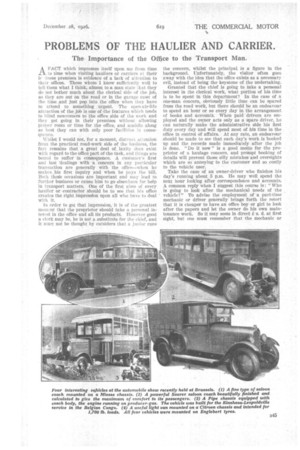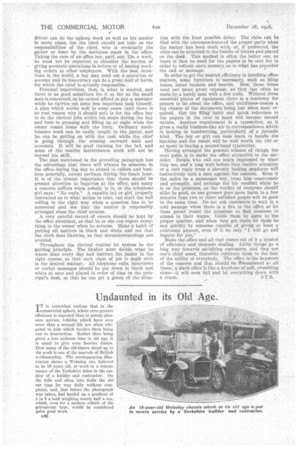PROBLEMS OF THE HAULIER AND CARRIER.
Page 63

Page 64

If you've noticed an error in this article please click here to report it so we can fix it.
The Importance of the Office to the Transport Man.
A FACT which impresses itself upon me from time It to time when visiting hauliers or carriers at their ly jness premises is evidence of a lack of attention to their offices. Those whom I know sufficiently well to tell them what I think, almost to a man state :hat they do not bother much about the clerical side of the job, as they are out on the road or in the garage most of the time and just pop into the office when they have to attend to something urgent. The open-air-life attraction of the job is one of -the features which tends to blind newcomers to the office side of the work and they get going in their premises without allowing proper room or time for the office, and muddle along as best they can with only poor facilities hi censequeace.
Whilst I would not, for a moment, distract at zention from the practical road-work side of the business, the fact remains that a great deal of laxity does exist with regard to the office part of the task, and things are bound to suffer in consequence. A customer's first and last 'dealings with a concern in any particular transaction are generally with the office—when he makes his first inquiry and when he pays the bill. Both the occasions are important and may lead to further business or cause him to go elsewhere for help in transport matters. One of the first aims of every haulier or -contractor should be to see that his office creates the right impression upon all who have to deal with it.
In order to get that impression, it is of the greatest moinisit that the proprietor should take a personal interest in the office and all its products. However good a clerk may be, he is not a substitute for the chief, and it must not be thought by outsiders that a Junior runs the concern, whilst the principal is a figure in the background. Unfortunately, the visitor often goes away with the idea that the office exists as a necessary evil, instead of being the keystone of the undertaking.
Granted that the chief is going to take a personal interest in the clerical work, what portion of his time is to be spent in this department? In the case of a one-man concern, obviously little time can be spared from the road work, but there should be an endeavour to spend an hour or so every day in the arrangement of books and account& When paid drivers are employed and the owner acts only as a spare driver, he can naturally make the administrative side his first duty every day and will spend most of his time in the office in control of affairs. At any rate, an endeavour should be made to see that each day's work is booked up and the records made immediately after the job is done. "Do it now" is a good motto for the proprietor of a haulage concern, and prompt booking of details will prevent those silly mistakes and oversights which are so annoying to the customer and so costly to the vehicle user.
Take the case of an owner-driver who finishes his day's running about 5 p.m. He may well spend the next hour looking after correspondence and accounts. A common reply when I suggest this course is: "Who is going to look after the mechanical needs of the vehicle?" To advise the employment of a part-time mechanic or driver generally brings forth the retort that it is cheaper to have an office boy or girl to look after the papers and let the owner do his own maintenance work. So it may seem in direct £ s. d. at first sight, but one must remember that the mechanic or driver can do the upkeep work as well as his master in ninny eases, but the clerk should not take on the responsibilities of the chief, who is eventually the gainer or loser by the decisions made in the office. Taking the case of an office boy, paid, say, 15s. a week, he must not be expected to shoulder the burden of giving accurate quotations in letters or of issuing work• ing orders to other -employees. With the best intentions in the world, a boy may send out a quotation or account and its inaccuracy can do a great deal of harm, for which the chief is actually responsible.
Personal supervision, then, is what is wanted, and there is no good substitute for it so far as the small man is concerned, as he cannot afford to pay a manager while he carries out some less important task himself. A plan which works well in some cases (and there is no real reason why it should not) is for the office boy to do the clerical jobs within his scope during the day and turn to greasing and filling up at night when the owner comes home with the lorry. Ordinary maintenance work can be easily taught to the junior, and he can be getting on with the task while the chief is going through the evening outward mail and accounts. It will he good training for the lad, and some of the routine maintenance work will not be beyond his skill.
The plan mentioned in the preceding paragraph has the advantage that there will always be someone in the office during the day to attend to callers and business generally, except perhaps during the lunch hour. It is of the utmost importance that there should be prompt attention to inquiries at the office, and many a concern suffers when nobody is in, or the telephone girl says: "No reply." A capable lad or girl, properly instructed as to what action to take, can start the ball rolling in the right way when a question has to be answered and see that the matter is responsibly arranged when the chief returns.
A very careful record of events should be kept by the office attendant, so that he or she can report everything to the owner when he returns. Make a habit of putting all matters in black and white and see that the clerk does likewise, so that misunderstandings are avoided.
Throughout the clerical routine let system be the guiding principle. The hbulier must decide what he wants done every day and instruct the junior in the right course, so that each class of job is dealt with In the desired manner. All telephone calls, interviews or verbal messages should be put down in black and white at once and placed in order of time on the principal's desk, so that he can get a grasp of the situa tion with the least possible delay. The chits can be filed with the correspondence,of the proper party when the matter has been dealt with, or, if preferred, the chits can he attached to the bundle of letters and placed on the desk. This method is often the better one, as there is then no need for the papers to be sent for in order to refresh one's memory as to what has preceded the calf or message.
In order to get the desired efficiency in handling office matters, some furniture is 'necessary, such as filing boxes, letter baskets and boards. Now, these items need not mean great expense, as they can often be made by a handy man with a few tools. Without these essential pieces of equipment there is a rtendency for papers to lie about the office, and untidiness-means a big chance of the documents being lost when most required. Get the filing habit and quick reference to the papers in the case in hand will become second nature. Another requirement is a typewriter, as it gives a really business-like air to correspondence which is lacking in handwriting, particularly of a juvenile kind. The boy or girl can soon learn to handle the machine and the result will be well worth the £10 or SO spent in buying a second-hand typewriter.
Having arranged the general scheme of things, the next point is •to make the office attractive to the outsider. People who call are much impressed by what they see, and a long wait before they receive attention or a curt reply from a slovenly looking employee will instinctively turn a man against the concern. Even if the caller be a messenger boy, treat him courteously and promptly, and arrange for his comfort while he is on the premises, as the verdict of everyone should alike be good, as one grouser does more harm in a few minutes than two or three satisfied people will do good in the same time. Do not ask customers to wait in a cold passage when there is a fire in the office or let them prowl round the premises to find someone to attend to their wants. Guide them by signs to the proper quarter, and when they get there let them be met quickly by someone capable of giving at least a courteous answer, even if it be only "I will go and inquire for you."
Make the office and all that comes out of it a symbol of efficiency and pleasant dealing. Little things go a long way towards satisfying customers, and they are one's chief asset, therefore cultivate them to the best of the ability of everybody. The Offire is the keystone of the concern and that should be tkinembered at all times; a slack office is like a keystone of soft, crumbling stone—it will soon fail and let everything down with
a crash. S.T.R.




































































































